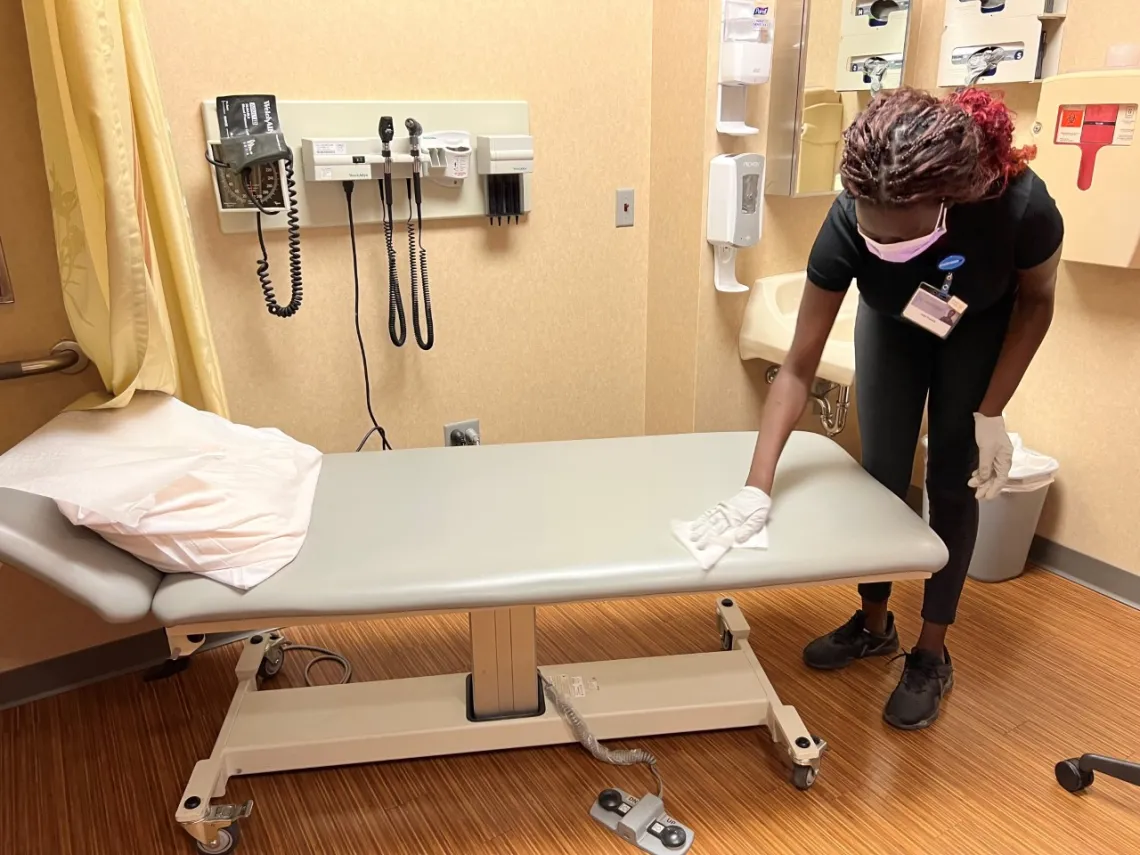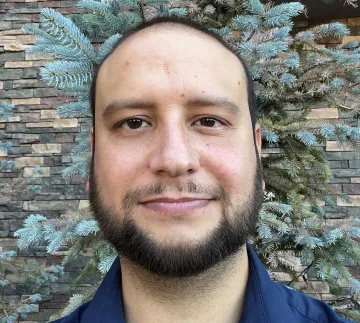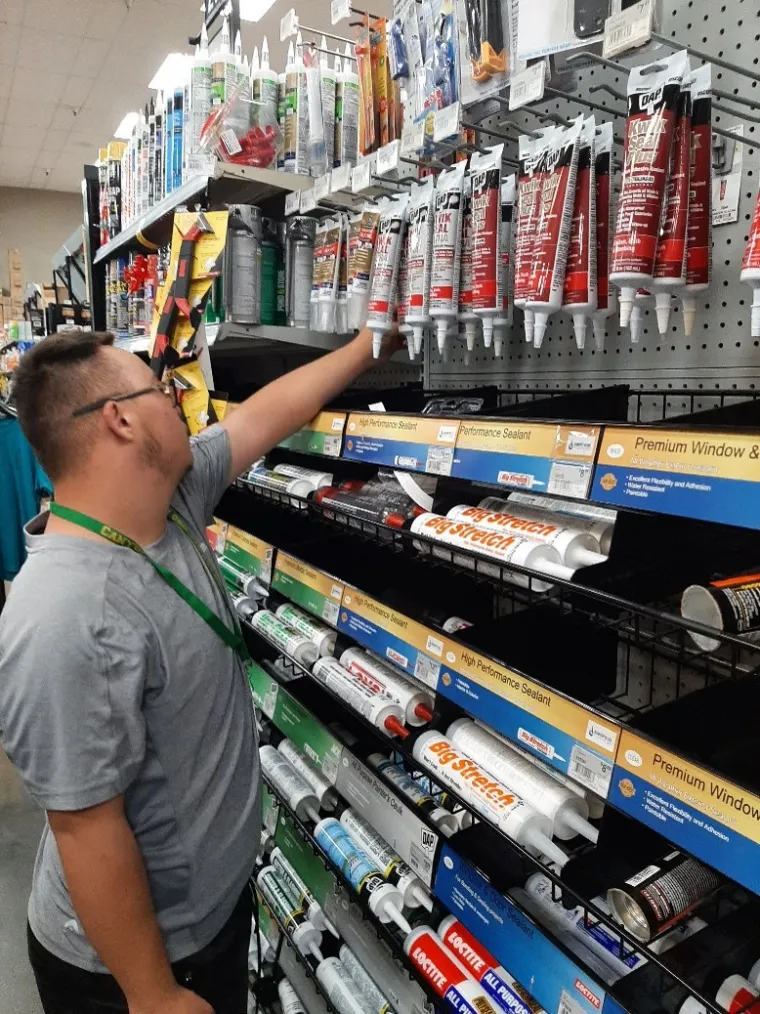Employment Initiatives for Transition Aged Youth: Making a Difference One Student at a Time

Project SEARCH intern cleaning exam table during their rotation at Mayo Clinic.
As high school students prepare to make their way in the world, schools seek to streamline the transition. This looks different for every student, but for students with disabilities, this process presents unique challenges. That is why the University of Arizona Sonoran Center for Excellence in Disabilities’ Employment Team, in partnership with Arizona Vocational Rehabilitation, is helping schools develop their own programs supporting students with disabilities.
The Sonoran Center Employment Team’s projects for transition aged youth are statewide in scope. Currently the Sonoran Center works with ten schools across Tucson, Phoenix, and the Tohono Oʼodham and efforts are underway to expand to Douglas.
The team is involved in multiple projects for young adults with disabilities. One of the main focuses is the Pre-Employment Transition Services (Pre-ETS) project. The goal of the project is to work in partnership with schools to expand their transition programs to include community work-based learning experiences in local businesses. This is a critical element leading to competitive employment outcomes following graduation.
“We partner with schools in different parts of the state and help train their staff on how to build relations with businesses, develop those work sites, and how to provide support to their students while at those work sites,” said Abel Young, the Sonoran Center’s Director of Community Services and the leader of the team. “We build a program the school can maintain, and we follow with technical assistance as needed to help them continue the program. Eventually the goal is for us to step back from that process, so the school has their own sustainable work-based learning program with just some technical assistance from us.”

Abel Young, the Sonoran Center’s Director of Community Services
In partnership with Tribal Vocational Rehabilitation, the Sonoran Center has expanded Pre-ETS to the Navajo Nation and is currently in development with Window Rock and Chinle school districts.
The Sonoran Center’s partnership with the Navajo Nation Office of Special Education and Rehabilitation Services, together with local schools, builds capacity for providing transition services and work-based learning opportunities that prepare and support Native youth with disabilities for post-secondary education and employment after graduation.*
In a similar vein is the Summer Work Program, which supports students with paid summer work experiences in real jobs where they receive competitive wages at the prevailing rate for the position, further gaining valuable experience and expanding their resume in preparation for achieving their career goals following high school.
The team also leads and coordinates Project SEARCH in the state, under Heather Wolff-Holstein, Sonoran Center’s statewide coordinator of employment initiatives. Project SEARCH is an international organization dedicated to establishing internship programs for students with disabilities around the world. According to Project SEARCH Arizona, around 70% of interns who have graduated from Project SEARCH Arizona have obtained competitive integrated employment**. The Sonoran Center coordinates Project SEARCH sites in Arizona, as well as recruits and establishes new sites in partnership with Vocational Rehabilitation and Project SEARCH national. In addition, the team helps implement Project SEARCH programs according to the fidelity model used by Project SEARCH sites nationwide.
Kelsey Montano, Project Coordinator for the Sonoran Center, emphasized that the relationship the Sonoran Center has with schools is very collaborative. They work with the schools and employers to help create a program that suits their unique needs and situation.
“It’s important to note that when we come in and gain these partnerships with these schools, we’re not coming in to tell them what to do — we’re coming in to help develop their program so it can be sustainable over time. We’re not here to step on other peoples’ toes, we’re here to build the bridge between all these working pieces to hopefully build a successful and sustainable program for not just us, but with others around us.”
All these efforts are guided by the principle of Employment First, a national movement founded on the belief that all people, including people with disabilities, should be able to work in their communities in competitive integrated employment, and that competitive employment should be considered the first option for all individuals receiving publicly funded services. The Sonoran Center has partnered with advocates and organizations around the state to make Employment First a foundational ideal for employers and service providers around Arizona. You can read more about Arizona Employment First here.

A student worker checks merchandise
“Our Pre-ETS program is a model demonstration of Employment First in action,” said Heather Wolff-Holstein. “We are dedicated to getting students out into the community for work-based learning experiences so that each student and their support team will set the expectation that competitive integrated employment is an immediate pathway once they graduate high school.”
The team is also working to implement a new initiative called Tech First. As the name implies, it focuses on implementing virtual supports or tech-based strategies in supporting people in their employment or programs, from virtual job coaching to providing assistive technology at the high level/advanced assistive technology or simple things like apps on a phone or tablet—however they can utilize tech to help someone with a disability be more successful in their job.
To learn more about the Sonoran Center’s employment projects focused on transition aged youth, please email ucedd@arizona.edu.
Funding for these programs is made possible in part by the Arizona Department of Economic Security - Vocational Rehabilitation Services and partnering schools and businesses. The views expressed do not necessarily reflect the official policies of these organizations and entities.
__________________________________________________________
* Funding made possible by the Navajo Nation Office of Special Education and Rehabilitation Services.
** Prior to the COVID-19 pandemic. Including 2019-2020 and 2020-2021 program years, the CEI outcome rate is 66%.
